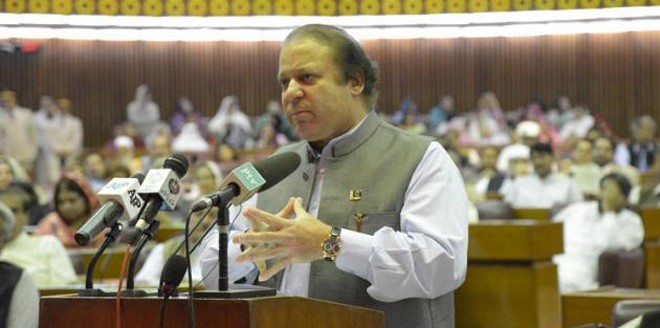

There is an apparent consensus on Operation Zarb-e-Azb. From political parties to analysts to liberal chattering classes, everybody seems to agree that the Operation has the potential to wipe all traces of terrorism from the face of this country and must be supported at all costs. There are guilty half-hearted admissions too that whatever collateral damage does accrue this time must be borne for the sake of larger peace.
In the last couple of months, we have become rather adept at forging consensuses. About two months back, after a popular anchorperson was shot in broad daylight, his employer channel ‘erred’ against the institution that is purported to be the defender of ‘national interest’ by blaming it for this attack. In a matter of days, everybody came around to the conclusion that the channel must be punished, even if illegally at the hands of the cable operators. After about a month and a half of dithering, the closure of the channel was legalised through Pemra, the regulatory body.
About two weeks back, the Karachi airport came under a merciless attack said to have been perpetrated by foreign militants residing in North Waziristan. This time, the consensus was quick; by next morning the security forces were being praised on the media for their remarkable valour in averting a bigger disaster. The media, too, was praised in turn for its ‘patriotic’ coverage of the deadly attack.
The latest consensus -- on Operation Zarb-e-Azb -- was the easiest to come by, it seems. With political parties at both ends of the spectrum, government and opposition, without a distinction of left or right (though Awami Workers’ Party’s statement is as paradoxical as PTI’s stance) and a tamed media supporting the Operation, this should have brought the matter to an end.
Except that it hasn’t.
There are clearly some unanswered questions about this Operation that may put the strength of the consensus into question. If anything, this could well be a manufactured one.
The first question to ask is whether the airport attack was actually a catalyst for the Operation that put the pro-talks prime minister "on the back foot". The assumption here is that the attack on the airport was unprovoked and had nothing to do with the aerial attack in North Waziristan, leading to 70 deaths including many civilians, launched by the military a few weeks back. The US drone attacks against Uzbek militants, who happen to be ‘our’ enemies for now, have further complicated the picture.
While the exact motivation for the timing of the military operation (which had been on the cards for a long time with former president Zardari hinting at it in 2009) is still not clear, it is surprising how the pro-talks prime minister turned into an anti-talks one in a matter of a couple of months.
No, there was no formal announcement declaring that the negotiations with the Tehreek-e-Taliban (TTP) had failed conclusively. On the other hand, the consensus in favour of talks was painstakingly evolved, despite the fact that the moral support was on the side of PML-N and PTI that had won the elections and had the democratic mandate to hold negotiations.
In September 2013, the federal government had convened an All Parties Conference (APC) that unanimously decided to hold talks with the militants in order to bring an end to militancy in the country. The signatories to the resolution included Pakistan People’s Party (PPP), Awami National Party (ANP), and Muttahida Qaumi Movement (MQM), the three parties that had actively supported the war against militancy in the last five years and had been targeted during and before the election for this stance.
It took some time before the TTP was brought around to the negotiating table with committees being formed and re-formed. It should be noted though that this time, as well as in all previous APCs that advocated the course of negotiations, the political forces were never backed by the intellectual class which clearly saw this as a useless exercise. They referred mostly to our "unique situation" with the extent of violence wreaked by these ‘beasts’ being extraordinary. The government could not be expected to be negotiating from "a position of weakness", these analysts argued.
Admittedly, there was let up in the violence once the negotiation process started. But somewhere somebody intervened and put a stop to this process. That brings us to the current round -- Operation Zarb-e-Azb. There is already a Wikipedia page for this Operation that lists among its supporters social media, PTI, MQM, ANP and United States.
Quite a consensus one must say.
Lest one misses it, there is an underlying consensus too: while the civilian setup seemed to have exercised some control till the negotiations were in progress, with this Operation the initiative, the announcement, the execution, and the subsequent information is all in the army’s hands.
As for those who live under the delusion that military operations are a panacea for terrorism, one fact should alone suffice: Mullah Fazlullah against whom Operation Rah-e-Haq was launched in Swat in 2008-9 is today head of the TTP. And we consider Swat Operation a huge success.